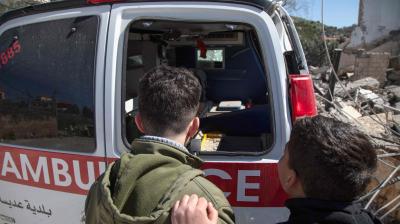VIP treatment for pets at Abu Dhabi hospital
A falcon being treated at an Abu Dhabi Hospital on Sunday. The hospital provides veterinary health care services exclusively to raptors. — PTI
A falcon being treated at an Abu Dhabi Hospital on Sunday. The hospital provides veterinary health care services exclusively to raptors. — PTI
Falcons, the majestic-looking raptors symbolising the Bedouin power, receive premier healthcare facilities at the world’s largest hospital of its kind here that has enthusiasts from all parts of the world, including from India.
With a patient influx of over 75,000 in the first 14 years of existence since it opened its gates in 1999 and annual figures currently touching as high as 11,200, the Abu Dhabi Falcon Hospital is the first public institution in the United Arab Emirates providing comprehensive veterinary health care services exclusively for falcons.
On entering the premises of the sprawling health facility established by environment agency Abu Dhabi, one is amazed at the well-planned infrastructure of the hospital that has an examination room, an operation theatre, a digital radiography un-it, a moulting room and an ophthalmology unit among others.
Rich emirs line up at the plush hospital, that is delightfully clean sans any unpleasant smell, for routine check-ups of their prized hunting birds or for any complications or surgeries. “We put the hoods on them so that they do not attack each other,” says technician R. Ranjith.
He removes the hood from the bird and puts its head under a tube to administer a light anaesthetic gas to make it fall asleep before examining whether the raptor needs a pedicure or an X-Ray.
The hospital performs extensive and exclusive training on falcon and avian medicine and husbandry for veterinarians, veterinary students, and veterinary nurses and assistants from all around the world, including France, Japan, India, Switzerland, USA, UK, Italy and Germany.
While hospital director Dr Margit Gabriele Muller told PTI that the hospital does not have backing from any Indian companies, authorities did not share details of the profits, current funding and the amount on which it was established.
“Many falconers bring their birds here during the moulting period for their proper care,” says the tour guide who identified himself as Dennis before opening a heavy door for the moulting cage, a dimly-lit air-conditioned aviary with ample space for the birds to fly around and relax.
Under new directives, a falconer now needs to register his bird and also get the bird a passport to fly to countries like Pakistan where hunting is still permitted. The birds also need to have a passport to fly and are the only birds allowed in the cockpit if there is lack of seats on board, he adds while flashing out such a passport listing details about the bird’s owner and breed.
Interestingly, the passport does not have a photograph of the falcon. “That’s because, during moulting season they shed all their feathers and later look very different,” Dennis says. That leaves one wondering, then how are the birds identified, to which Dennis adds that there are metal rings using which the falcons are ringed when young and has details like its owner’s name and number.
And if that was not enough, the birds have an electronic chip implanted for tracing them and in determining their identities. The birds that feature on the emblem of the United Arab Emirates are used for falconry, now considered as a national sport and status symbol for young Emirati men which was once traditionally used as a way to obtain food.
Over the years, the hospital has established a loyal and a wide patient-base not just in the UAE, but also in countries like Saudi Arabia, Qatar, Kuwait and Bahrain, according to its website that also points out the hospital started its own falcon breeding centre in 2011 to breed the birds for its customers. Another feather to its cap was added in 2007 when the hospital opened its Pet Care Centre, marking a major step in becoming a comprehensive animal care centre. It comprises VIP boarding kennels for dogs and cats as well as pet grooming and dog training facilities.
The centre has complete suites for cats and offers owners to leave their pets and go anywhere, without being too heavy on their pockets, Dennis said.

















